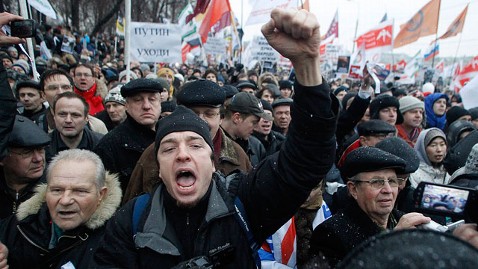‘Russia Is Waking Up,’ Former Prime Minister Says Amid Massive Protests
Tens of thousands of people took to the streets in Moscow today, in the largest of more than 70 protests across Russia, to voice their anger at alleged election fraud and to demand that the results of the parliamentary elections be cancelled, a new election be held, and Prime Minister Vladimir Putin resign.

Opposition leader Boris Nemtsov, one of the organizers of the rally, explained the protesters' demands to ABC News.
"Our demand is to cancel these criminal elections, because Putin stole about 13 million votes. Secondly, to fire Mr. [Vladimir] Churov, who is responsible for the election and to organize a criminal investigation against him. The third point is to register the opposition. For example, I represent the People's Freedom Party. [Churov] rejected us from registration. Next point, in the next election, freedom for political prisoners. I feel that we have reached a point where people are very angry against corrupt and criminal power," said Nemtsov.
Posters read, "Crooks and thieves have stolen our votes," "Putin go away," "Free and honest elections," and "We are not mute."
Police estimated that 20,000 people protested at Bolotnaya Square in downtown Moscow, on an island across from the Kremlin. But organizers claim that more than 100,000 gathered, calling it Russia's biggest demonstration since the collapse of the Soviet Union.
About 50,000 police and 2,000 paramilitary troops were deployed in Moscow in preparation for the protests. Most rallies across Russia were approved by city authorities in an effort to avoid violence, which was seen as a sign that the Kremlin has started to sense the people's change of mood.
Aside from the politicians who addressed the crowd were Boris Akunin, one of Russia's best-selling authors, and writer Dmitry Bykov, as well as TV personality Tatyana Lazareva.
The protests were mostly peaceful, with few clashes and arrests. As people left the square, they said, "Thank you" to the police.
Neither Putin nor President Dmitry Medvedev commented on the demonstrations.
Former Prime Minister and opposition leader Mikhail Kasyanov told ABC News that today was a happy day.
"People are finally waking up. Russia is waking up. I think that it's the beginning of the end of Putin's regime today. Today all political groups are here … talking about the same thing," he said. "These elections were not valid. That's what our demand is, to announce these elections void and to call for a free election. We need free, fair and credible elections."
Eugenia Albats, editor in chief of the liberal opposition magazine The New Times, said she was impressed by how many young people turned out for the demonstration.
"I am disgusted with the people in power. … It's no longer tolerable. I think it's time to tell Putin, 'It's time for you to step down,'" Albats told ABC News. "We've never seen such young faces at the democratic rallies. This is young Russia, the people of this new generation who are telling Putin, 'Go. Step down. Your time is over; we are not going to tolerate this anymore.'"
The protest was a test of the opposition's ability to turn public anger into a mass protest movement on the scale of the Arab Spring rebellions that brought down rulers in the Middle East and North Africa.
"This rally shows that Russia is waking up, that the civil society in Russia does exist, that the middle class in Russia does exist. All across Russia, people are ready for the party in power, and most importantly Putin, to step down. He has to go. It is just the very beginning of a very difficult protest to get the country back to the people. It will take not weeks, it will take months," Albats said. "The whole question is whether Putin decides not to shoot at his own people, or he decides to use power against us. It's a very likely possibility."
The protest organizers have given authorities two weeks to implement their demands. If their demands are not realized, they have scheduled a rally for Dec. 24.
"We will be back," the crowd shouted.
ABC News' Tanya Stukalova contributed to this report from Moscow.